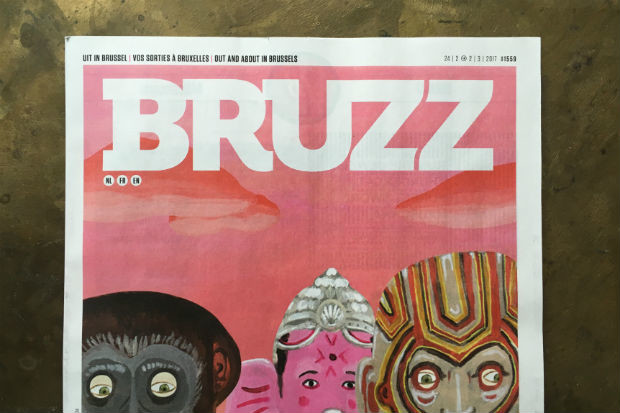Taking up residence on one floor of the former House of Radio in Brussels is Bruzz, a media organisation serving the Dutch speaking community of the city as well as those in other parts of the country who are interested in news from Brussels.
News, features and other programming from Bruzz can be found on television, on the radio, online, on social media, in a free weekly newspaper, and in a free magazine. But up until a year ago, these channels operated separately, with their own different names and branding.
The new Bruzz offering came about as key figures inside the parent organisation, as well as those who funded it – at least 60 per cent of funding for Bruzz comes from the state – thought merging the different channels under one name would make growing its audience an easier task.
"We merged last year and that was an interesting process," Jeroen Roppe, director of strategy and communication at Bruzz, told Journalism.co.uk.
"We were convinced of the fact that we could reach a wider audience if we worked under one label and that was always my conviction, but it was difficult to convince the journalists and the people who worked for the different units.
"People were of course devoted to their product and they were very attached to the old labels, which is logical I think. So that was a very difficult thing to do, to make them realise that it was the end of an era."
Getting everyone involved in the merger was a key part of winning the case, and in the early stages of the process, new teams were created and asked to work on different elements such as the new name of the brand or the organisation of the newsroom.
The following step was changing the architecture of the office and getting everyone to sit together in an open space. Setting up what Roppe calls "the central table", where each person represents a particular channel, was integral to the new workflow to which Bruzz was aspiring.
"Then the next step was to get rid of the old labels and to introduce the new name, so everybody followed one flag, the Bruzz flag, and that was of course the most decisive step."
The final step involved moving from a multimedia company, where different teams worked on different media, to a cross-media organisation, where everyone worked as one team to produce content for the different channels, Roppe explained.
"The most difficult thing for me personally was to find an organisational model to implement the strategy. I was convinced of the strategy, that was for me very clear, but to convince the people who are responsible for the execution of the strategy, that was the most difficult thing. That central table played a very important role in that change."
Rebranding also posed some questions for Bruzz’s social media presence – Facebook allowed the organisation to rename its pages but some Twitter accounts had to be started from scratch.
The social media team consists of two full time, dedicated staff members, who were at first tasked with training the rest of the team how to make the most of each platform under the new name.
Their focus has now turned towards producing original content for the social channels, which the team does in collaboration with the other journalists in the newsroom.
Facebook and Instagram are Bruzz’s key social channels, and the team is currently assessing whether WhatsApp could be a good platform for sharing breaking news with its community.
But the biggest change that will come to Bruzz’s output in the next year is another merger: that of its two print products, the weekly newspaper and the magazine, which focuses on events.
The new print product will emulate the magazine’s format, but feature some of the newspaper’s more newsy content. One of the key features of the magazine, the fact that it includes articles in Dutch, French and English, will live on.
"The magazine is the only trilingual product we have, and that is to attract people who speak other languages other than Dutch to Bruzz," explained Roppe.
"We also do that on television, for instance everything is subtitled in French and in English. We do that online, we have English pages and French pages, we have radio programmes only in French and only in English, but they are always surrounded in a Dutch context and that is how we try to bring the audience in contact with the Dutch language."
Update 24 February 2017: A previous version of this article misstated Roppe's job title. He is director of strategy and communication at Bruzz, not editor-in-chief.
Free daily newsletter
If you like our news and feature articles, you can sign up to receive our free daily (Mon-Fri) email newsletter (mobile friendly).










